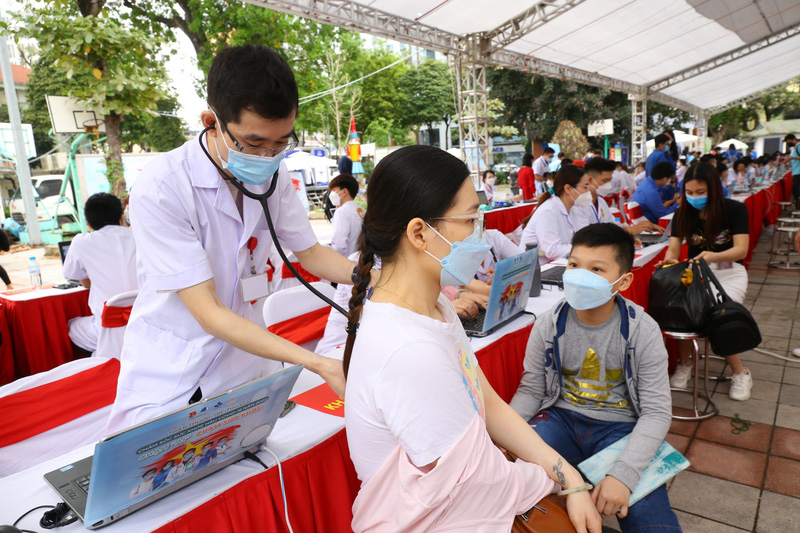68% of patients persisted post-COVID-19 symptoms for 2 to 5 months

Illustration.
A study led by the Vietnam Young Physicians Association surveyed over 17,000 people participating in the post-COVID-19 health care program in the Journey of Young Doctors to follow Uncle Ho’s orders, volunteering for public health in the community. In May 2022, the study pointed out many important issues.
A cross-sectional study on voluntary residents who registered and attended the program for post-COVID-19 check-ups, including: All people who have ever had COVID-19 with post-COVID symptoms -19 as listed by the Ministry of Health, lasting more than 4 weeks; Priority is given to policy beneficiaries, children under 15 years old and people with underlying medical conditions.
A total of 17,093 people participated in the survey, which focused on young workers, aged 16-35, with 13,313 responses, accounting for 77.89%. At the same time, the research team also divided the data in the group of patients with underlying diseases (cancer, diabetes, cardiovascular disease, chronic pneumonia) to evaluate separately, conduct logistic regression analysis of the relationship between the diseases. Characterized by the patient’s condition with post-COVID-19 symptoms after 6 months.
The results show that: Most of the patients still have post-COVID-19 symptoms for 2 – 5 months (about 68%), however, up to 17.4% of patients have post-COVID-19 symptoms for more than 5 months. and about 5% of patients still have these symptoms 10 months after testing positive for SARS-CoV-2 virus.
Patients usually have 2-3 typical symptoms related to post-COVID-19 out of 203 symptoms that the Ministry of Health has identified, mainly focusing on the group of mental illnesses such as (dizziness, headache, difficulty concentrating, insomnia…) and respiratory diseases group (cough, difficulty breathing).
The study found that the severity and duration of COVID-19 symptoms were not related to duration of COVID-19 infection (only 2% were positive for SARS-CoV-2 more than 14 days) or severity when infected with COVID-19 (severe symptoms and hospitalization for COVID-19 infection are less than 10%), compared with some previous studies that suggested an association between prolonged infection time and severity of infection. important when infected with COVID-19 with post-COVID-19 symptoms.
According to the study, the proportion of women tends to be higher than that of men in terms of the likelihood of prolonged COVID-19 (64.63% female – 35.37%), which is also stated in many previous studies.
Through the measurement of the patient’s height and weight, the research team used BMI to classify and record 28.74% of the underweight patients and 8.71% of the obese patients, showing that nutrition Inadequacy or obesity can also make people more likely to have persistent COVID-19 symptoms.
70.80% of patients consciously exercised themselves (exercise, practice breathing) after being infected with COVID-19.
The study also shows that people’s health care trend is gradually shifting towards digitization. Up to 33% of patients tend to choose regular monitoring and health care via mobile App, nearly equal to the proportion of people who choose the traditional method of going to the hospital for examination (36.3%). This can be a good sign for the health sector when people are ready for telemedicine services, gradually reducing the burden on the treatment line.
The study also showed that for the group of young workers, the underlying medical condition was not a factor affecting the likelihood of prolonged COVID-19 syndrome (only 3.6% of patients had an underlying medical condition). However, through the regression analysis, the study showed that for male patients, having COVID-19 duration of more than 14 days, smoking, drinking alcohol and not exercising all increased the risk. prolongation of post-COVID-19 symptoms.
In the context of the country gradually adapting to the new normal, prolonged post-COVID-19 or COVID-19 symptoms, especially for the young workforce, are a new challenge for the Health sector as well as the country. In general, Vietnam currently has nearly 11 million people infected with COVID-19, with the majority of people of working age, to ensure the health of this workforce is also to ensure the development of human resources. To develop the country, it is necessary for all sectors and levels to have appropriate policies to support the people to serve their needs post-COVID-19 recovery.
For people who have been infected with COVID-19, it is necessary to increase physical activity and proper nutrition. Get information through official sources, avoid self-administration of unspecified drugs (especially antibiotics), avoid using drugs of unknown origin, traditional medicines, and ethnic medicines not yet recommended by the Ministry of Health for treatment. or support post-COVID-19 recovery.
In addition, it is necessary to monitor the condition, pay attention to rare syndromes (autoimmunity, prolonged chest pain, …) but also avoid panic, seek medical attention when not necessary.
at Blogtuan.info – Source: Afamily.vn – Read the original article here



